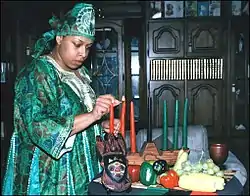Kinara
The kinara is a seven-branched candleholder used in Kwanzaa celebrations in the United States, inspired by and using elements of the nine-branched Menorah (Hanukkah) used in Hanukkah celebrations.[1]

Description
During the week-long celebration of Kwanzaa, seven candles are placed in the kinara—three red on the left, three green on the right, and a single black candle in the center. The word kinara is a Swahili word that means candle holder.
The seven candles represent the Seven Principles (or Nguzo Saba) of Kwanzaa. Red, green, and black are the symbolic colors of the holiday.
During the week of Kwanzaa, a new candle is lit on the kinara each day. The center black candle is lit first, and the lighting then proceeds from left to right, the new candle being lit corresponding to the principle of that day. In this way, each day of Kwanzaa is dedicated to the contemplation of one of the Seven Principles. The first known use of the word "Kinara" is dated 1975.[2]
Each of the candles also has a meaning. The black one symbolizes the African people, the red their struggle, and the green the future and hope that comes from their struggle.
References
- Images, Getty. "Why Do the Kwanzaa Kinara and the Hanukkah Menorah Look Alike?". The Forward. Retrieved 2020-12-27.
- "Definition of KINARA". www.merriam-webster.com. Retrieved 2019-12-20.